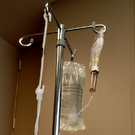Elotuzumab In Combination With Revlimid And Dexamethasone Shows Encouraging Results In Multiple Myeloma (ASH 2009)

Preliminary results from an ongoing Phase 1/2 clinical trial suggest that elotuzumab, in combination with Revlimid (lenalidomide) and low-dose dexamethasone (Decadron), may have potential in the treatment of multiple myeloma. The findings were presented at the American Society of Hematology’s 51st Annual Meeting at the beginning of last month.
Dr. Ravi Vij from the University of Washington in St. Louis, co-author of the study, remarked, “The trial showed very high rates of response when elotuzumab is given in combination with Revlimid.”
Elotuzumab is a new drug that is currently being investigated as a potential treatment for multiple myeloma. It targets proteins that are on the surface of myeloma cells, but not healthy cells. When the drug identifies a cancerous cell, it triggers the cell’s death.
The goal of this study was to determine maximum tolerated dose of elotuzumab in combination with Revlmid and low-dose dexamethasone in patients with relapsed multiple myeloma. Researchers also examined the efficacy and toxicity of the drug in patients with relapsed or refractory multiple myeloma.
Patients enrolled in this clinical trial took three different doses (5 mg/kg, 10 mg/kg or 20mg/kg) of elotuzumab in combination with 25 mg of Revlimid, given on days 1-21 in a 28-day cycle, and 40 mg of low-dose dexamethasone, given once weekly.
Researchers observed at least a partial response in 92 percent of the patients who had completed at least two treatment cycles. This means that the drug removed at least half of the patients’ abnormal proteins and any tumors shrunk by at least 50 percent.
They did not observe any dose-limiting toxicities, and the maximum tolerated dose was not established.
Common side effects associated with this drug included neutropenia (low number of white blood cells), thrombocytopenia (low number of platelets), fever, and chills.
“Currently a randomized Phase 2 extension trial is going to look at two different dose levels to see if [the drug] is as effective at a lower dose,” Vij added. “[This year], the plan is to do a multinational Phase 3 trial.”
The study’s authors were optimistic about the efficacy of the drug and encouraged by what they called “manageable” side effects.
For more information, please see abstract 432 on the ASH meeting Web site.
Related Articles:
- None Found
